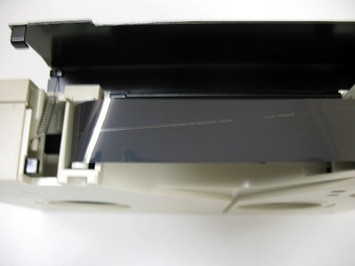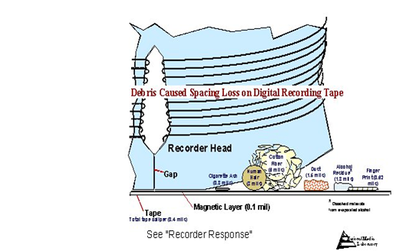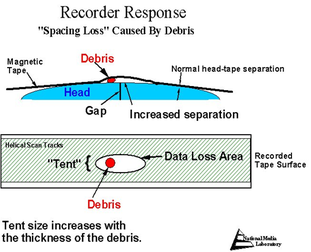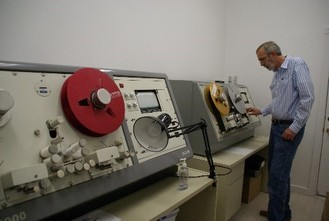WHITE PAPER: The Benefits of Tape Cleaning
Failure to clean tapes before digitization can result in inferior copies due to unnecessary defects and signal loss during the transfer. In the worst cases, failure to test and clean tapes can seriously damage the originals during the transfer attempts, making the transfers fail and potentially losing the content on the tapes in the areas of damage permanently. Cleaning tape before playback is an essential part of making sure you get the best transfer possible from your original as well as protecting that material from damage. When you digitize content, the file you create will be your new “master”. Shouldn’t that new master be as good and complete a copy of the original as possible?
Who else says cleaning tape before playback for re-mastering is essential?
According to American National Standards (ANSI It9-23), “If during inspection there is any evidence of dirt or debris on tape or in the container or shell, appropriate cleaning shall be done”.
According to International Standards (ISO 18933), “Magnetic tapes can be damaged physically during usage if both the tape and the machinery are not clean and well maintained. Debris on the tape or tape path components will cause scratching, scoring, or abrasion of the tape and machine read/write heads.”
The picture shows permanent loss of recording surface where tape was scratched by debris.
Who else says cleaning tape before playback for re-mastering is essential?
According to American National Standards (ANSI It9-23), “If during inspection there is any evidence of dirt or debris on tape or in the container or shell, appropriate cleaning shall be done”.
According to International Standards (ISO 18933), “Magnetic tapes can be damaged physically during usage if both the tape and the machinery are not clean and well maintained. Debris on the tape or tape path components will cause scratching, scoring, or abrasion of the tape and machine read/write heads.”
The picture shows permanent loss of recording surface where tape was scratched by debris.
Dr. John Van Bogart (Principal Investigator, Media Stability Studies, National Media Laboratory), states “Dust, smoke particles and tape debris present in the environment can get wound into the tape pack …, resulting in dropouts when the tape is subsequently played. The lost signal is generally greater than expected from the size of the particle. ” In A Guide for Libraries and Archives, he offers the following diagrams to illustrate the size of even small contaminants and their effect if they are not cleaned from the tape before playback.
Dr. Edward Cuddihy (the “father” of research into tape decay) advises that tape that has shown signs of decay should be cleaned “before attempting playback.”
NASA, 3M, SONY, AMPEX, the BBC and many others have done numerous studies that show the efficacy of tape cleaning in reducing defects, protecting both tape and machinery from damage, improving signal response during playback and even returning many tapes that were considered “unusable” to a “perfectly acceptable” condition for playback after “the tape was cleaned” (3M “1 Inch Video Tape and the VTR-A White Paper”).
After the Library of Congress held Public Hearings on "The Current State of American Television and Video Preservation", a Task Force was set up to review the findings and suggest National initiatives. William Murphy, of the Library of Congress, asked the Task Force to consider the idea that “cleaning videotape before remastering should be as automatic as cleaning film before duplication”.
When so many experts agree on how important tape cleaning is, why don’t more facilities clean tape before they transfer your materials? Quite simply, they don’t have the equipment or expertise to do it correctly.
Since the “era” of tape is essentially over, very little tape cleaning machinery is available. Even should an organization be able to obtain equipment, they likely have little experience with its operation. Effective tape cleaning is not a simple matter of putting a tape on a machine and letting it run. Different formats need different machinery and different tape problems require different cleaning procedures.
Another possibility is that some facilities may bypass the cleaning and restoration procedures in order to offer “bargain” transfer and digitization prices.
At SPECS BROS. we have over 30 testing and tape cleaning machines. We also have over thirty additional specialty rigs for specific tape restoration and cleaning procedures. We helped develop many of the machines and worked closely with the design engineers over decades to improve performance. In addition, our machines have been further modified specifically to deal with old or compromised tapes. Our machines can operate at different speeds, different tape tensions and use different cleaning methods depending on what a tape needs. We developed the tape cleaning procedures that other facilities use. We just have better machines, more machines, more experience and a more in-depth knowledge of how to use the equipment for the best results.
NASA, 3M, SONY, AMPEX, the BBC and many others have done numerous studies that show the efficacy of tape cleaning in reducing defects, protecting both tape and machinery from damage, improving signal response during playback and even returning many tapes that were considered “unusable” to a “perfectly acceptable” condition for playback after “the tape was cleaned” (3M “1 Inch Video Tape and the VTR-A White Paper”).
After the Library of Congress held Public Hearings on "The Current State of American Television and Video Preservation", a Task Force was set up to review the findings and suggest National initiatives. William Murphy, of the Library of Congress, asked the Task Force to consider the idea that “cleaning videotape before remastering should be as automatic as cleaning film before duplication”.
When so many experts agree on how important tape cleaning is, why don’t more facilities clean tape before they transfer your materials? Quite simply, they don’t have the equipment or expertise to do it correctly.
Since the “era” of tape is essentially over, very little tape cleaning machinery is available. Even should an organization be able to obtain equipment, they likely have little experience with its operation. Effective tape cleaning is not a simple matter of putting a tape on a machine and letting it run. Different formats need different machinery and different tape problems require different cleaning procedures.
Another possibility is that some facilities may bypass the cleaning and restoration procedures in order to offer “bargain” transfer and digitization prices.
At SPECS BROS. we have over 30 testing and tape cleaning machines. We also have over thirty additional specialty rigs for specific tape restoration and cleaning procedures. We helped develop many of the machines and worked closely with the design engineers over decades to improve performance. In addition, our machines have been further modified specifically to deal with old or compromised tapes. Our machines can operate at different speeds, different tape tensions and use different cleaning methods depending on what a tape needs. We developed the tape cleaning procedures that other facilities use. We just have better machines, more machines, more experience and a more in-depth knowledge of how to use the equipment for the best results.




